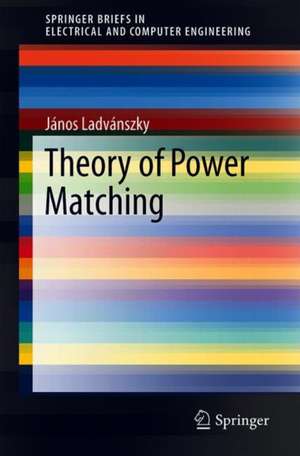Theory of Power Matching: SpringerBriefs in Electrical and Computer Engineering
Autor János Ladvánszkyen Limba Engleză Paperback – 22 mai 2019
Din seria SpringerBriefs in Electrical and Computer Engineering
- 19%
 Preț: 427.19 lei
Preț: 427.19 lei -
 Preț: 377.35 lei
Preț: 377.35 lei -
 Preț: 380.07 lei
Preț: 380.07 lei -
 Preț: 378.12 lei
Preț: 378.12 lei - 20%
 Preț: 379.08 lei
Preț: 379.08 lei -
 Preț: 377.18 lei
Preț: 377.18 lei - 20%
 Preț: 234.68 lei
Preț: 234.68 lei - 20%
 Preț: 232.43 lei
Preț: 232.43 lei -
 Preț: 378.12 lei
Preț: 378.12 lei -
 Preț: 377.18 lei
Preț: 377.18 lei - 20%
 Preț: 231.41 lei
Preț: 231.41 lei -
 Preț: 377.18 lei
Preț: 377.18 lei -
 Preț: 377.95 lei
Preț: 377.95 lei -
 Preț: 444.74 lei
Preț: 444.74 lei -
 Preț: 382.36 lei
Preț: 382.36 lei -
 Preț: 378.12 lei
Preț: 378.12 lei -
 Preț: 378.92 lei
Preț: 378.92 lei - 20%
 Preț: 232.43 lei
Preț: 232.43 lei -
 Preț: 376.80 lei
Preț: 376.80 lei -
 Preț: 377.35 lei
Preț: 377.35 lei -
 Preț: 377.18 lei
Preț: 377.18 lei -
 Preț: 381.00 lei
Preț: 381.00 lei -
 Preț: 376.43 lei
Preț: 376.43 lei -
 Preț: 377.18 lei
Preț: 377.18 lei -
 Preț: 378.54 lei
Preț: 378.54 lei - 20%
 Preț: 321.20 lei
Preț: 321.20 lei -
 Preț: 377.73 lei
Preț: 377.73 lei -
 Preț: 341.75 lei
Preț: 341.75 lei -
 Preț: 344.25 lei
Preț: 344.25 lei -
 Preț: 379.09 lei
Preț: 379.09 lei - 20%
 Preț: 324.64 lei
Preț: 324.64 lei -
 Preț: 377.57 lei
Preț: 377.57 lei -
 Preț: 378.71 lei
Preț: 378.71 lei - 20%
 Preț: 321.66 lei
Preț: 321.66 lei - 20%
 Preț: 230.85 lei
Preț: 230.85 lei -
 Preț: 374.30 lei
Preț: 374.30 lei -
 Preț: 375.45 lei
Preț: 375.45 lei -
 Preț: 360.05 lei
Preț: 360.05 lei -
 Preț: 381.43 lei
Preț: 381.43 lei -
 Preț: 378.34 lei
Preț: 378.34 lei -
 Preț: 376.22 lei
Preț: 376.22 lei - 20%
 Preț: 323.99 lei
Preț: 323.99 lei -
 Preț: 380.07 lei
Preț: 380.07 lei -
 Preț: 375.62 lei
Preț: 375.62 lei - 20%
 Preț: 321.20 lei
Preț: 321.20 lei -
 Preț: 377.18 lei
Preț: 377.18 lei - 5%
 Preț: 361.80 lei
Preț: 361.80 lei -
 Preț: 378.12 lei
Preț: 378.12 lei -
 Preț: 375.07 lei
Preț: 375.07 lei -
 Preț: 376.22 lei
Preț: 376.22 lei
Preț: 376.59 lei
Nou
Puncte Express: 565
Preț estimativ în valută:
72.06€ • 75.43$ • 59.98£
72.06€ • 75.43$ • 59.98£
Carte tipărită la comandă
Livrare economică 31 martie-14 aprilie
Preluare comenzi: 021 569.72.76
Specificații
ISBN-13: 9783030166304
ISBN-10: 3030166309
Pagini: 70
Ilustrații: XV, 76 p. 21 illus., 2 illus. in color.
Dimensiuni: 155 x 235 mm
Greutate: 0.15 kg
Ediția:1st ed. 2019
Editura: Springer International Publishing
Colecția Springer
Seria SpringerBriefs in Electrical and Computer Engineering
Locul publicării:Cham, Switzerland
ISBN-10: 3030166309
Pagini: 70
Ilustrații: XV, 76 p. 21 illus., 2 illus. in color.
Dimensiuni: 155 x 235 mm
Greutate: 0.15 kg
Ediția:1st ed. 2019
Editura: Springer International Publishing
Colecția Springer
Seria SpringerBriefs in Electrical and Computer Engineering
Locul publicării:Cham, Switzerland
Cuprins
Chapter 1. Introduction: Importance.- Chapter 2. Overview.- Chapter 3. Linear, time invariant one ports: A derivative-free proof of the global optimum.- Chapter 4. Nonlinear, resistive case.- Chapter 5. Linear multiports, competitive power matching (Lin).- Chapter 6. The scattering matrix (Belevitch approach), with application to broadband matching.- Chapter 7. Foundation concepts based on power matching (Youla, Castriota, Carlin).- Chapter 8. Special cases: Describing functions and weakly nonlinear case (Own results).- Chapter 9. The most general solution (Wyatt).- Chapter 10. Conclusions.
Notă biografică
Dr. J. Ladvánszky has an MSc degree in electrical engineering from the Budapest University of Technology and Economics in 1978, and a PhD degree in microwave circuits from the Hungarian Academy of Sciences in 1988. He is just before defending his DSc degree in optics from the Hungarian Academy of Sciences. His present interest is circuit and system theory with microwave and optical applications.
Textul de pe ultima copertă
This book describes the development of the power matching problem. It starts with the derivative-free proof of conjugate matching, goes through the nonlinear, resistive maximum power theorem and its reversal, extension of the concept of equivalence in the case of nonlinear circuits, application of the nonlinear, and resistive maximum power theorem for diode measurement. The author treats practically important special cases of nonlinear, dynamic power matching with applications, and the most general solution that is not realizable.
- Discusses the derivative-free proof of conjugate matching, the problem of equivalence in nonlinear circuits;
- Covers applications of the theory presented, such as maximum power load of a microwave power amplifier, image parameter matching, and application of power matching for economical problems;
- Includes proof of existence of the scattering matrix and causality of linear, passive circuits;
- Includes a table containing all known formulae for power matching.
Caracteristici
Discusses the derivative-free proof of conjugate matching, the problem of equivalence in nonlinear circuits Covers applications of the theory presented, such as maximum power load of a microwave power amplifier, image parameter matching, and application of power matching for economical problems Includes proof of existence of the scattering matrix and causality of linear, passive circuits Includes a table containing all known formulae for power matching
